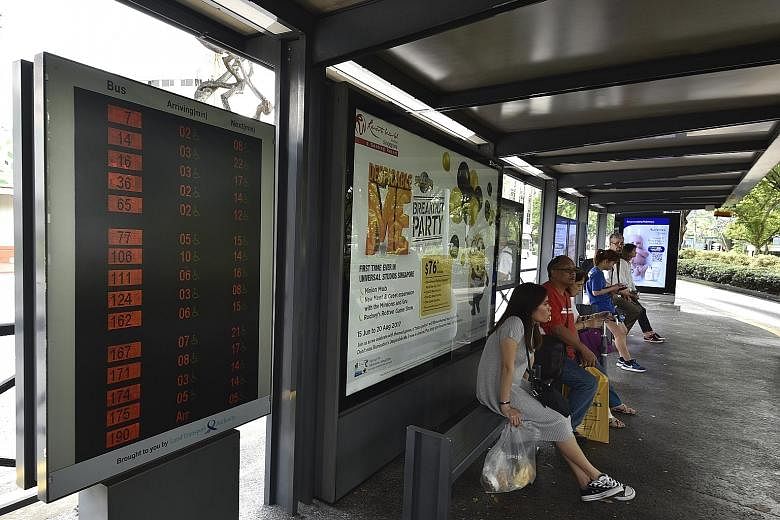Summon a public bus with just a tap on a phone, then get off where you need to.
Taking a cue from ride-hailing apps, such an "on-demand, dynamically routed" bus mode is set to be put on trial in the second half of next year by the Land Transport Authority (LTA). This is to see if such customised bus services could lead to shorter waiting times and lower running costs.
The LTA is targeting routes which have low demand during off-peak hours, believing that the buses can better serve commuters by being on call.
Routes being considered for the trial include services 253, 255 and 257 in Joo Koon, 84 and 382 in Punggol North and Punggol West, and 400 and 402 for Shenton Way and Marina South.
"Instead of being able to alight only at a bus stop along a predetermined, fixed route, he or she can ask to alight at any bus stop in the operating area, making the commute more seamless and convenient than today," said the LTA.
The first phase, for which the tender was announced yesterday, will require winning firms to simulate service quality and see what resources will be needed for the on-demand system.
In the second phase, systems proposed by these firms will be tested by public bus operators selected in a separate tender, before beginning actual trials in the second half of next year. During the trial, the usual scheduled bus services will continue to be run, but less frequently.
-
ROUTES EYED FOR TRIAL
-
Routes being considered for the trial include:
• Services 253, 255 and 257 in Joo Koon;
• Services 84 and 382 in Punggol North and Punggol West;
• Services 400 and 402 for Shenton Way and Marina South.
LTA said that in the lead-up to the actual trial, it "will work with the bus operators and communities to educate and assist residents and commuters in the trial areas on how to use such bus services".
LTA public transport group director Yeo Teck Guan said the new system will leverage data analytics and mobile application technology, which "have revolutionised the way that we travel, as we have seen in the success of ride-hailing" services.
Such on-demand bus services can help bridge the gap between taxis and buses, said Singapore University of Social Sciences lecturer Park Byung Joon, who specialises in urban transport.
He suggested, however, that the service could rely on smaller buses, instead of the larger single-deck ones which can carry about 50 passengers, as they could be more manoeuvrable as well as cheaper to run. Similar services in other countries, such as Chariot in the United States, also rely on minibuses.
National University of Singapore transport researcher Lee Der Horng said that while such services might be in demand in areas where public transport is not well developed, they might have limited impact elsewhere as bus services here have greatly improved in the past few years.
The Bus Service Enhancement Programme, for instance, has introduced new bus routes and added 950 buses since 2012, he pointed out.
Teacher Ng Wan Ching, 27, hopes the new service can cut travel time. A 5km trip from her Upper Thomson home to Bishan currently takes about 50 minutes and requires her to change buses at least once.
One commuter wondered how disruptive it would be if buses had to constantly change routes.
Lawyer Audrey Teng, 26, compared the proposed bus trial to ride-sharing services GrabShare and UberPool, which she said could be "super inefficient" as drivers had to make diversions to pick up other passengers.
"It might actually increase travelling and waiting time for buses," she said.
How similar services have fared elsewhere
The "dynamically routed" bus services which the Land Transport Authority (LTA) hopes to trial late next year are far from new. There have been similar services here as well as in countries such as the United States and China.
The Straits Times takes a look at some of these services.
BEELINE
This "crowdsourced" shuttle bus service was a 2015 initiative between the then Infocomm Development Authority, the LTA and private bus operators.
The service uses data analytics and public feedback to generate routes.
As of March, there are 34 routes and more than 3,800 monthly bookings.
Ride-hailing firm Grab's GrabShuttle service, which began in March, is also powered by the Beeline platform.
KUTSUPLUS
Kutsuplus, which operated in Helsinki, Finland, is believed to be first to offer on-demand buses, starting in 2013.
Yet despite its popularity - with more than 20,000 registered users at its peak - it was shut down two years later, as the authorities deemed the €20 (S$32) charge for each ride, which is subsidised by the public, too costly for taxpayers.
SHUTTL
The Delhi-based start-up began operating two years ago, and currently offers 450 buses on 75 routes. Its 20,000 rides each day are priced at between $1 and $2, depending on the route.
Shuttl currently faces competition from a number of challengers, including Ola Shuttle, a mini-bus service operated by ride-hailing firm Ola.
CHARIOT
The start-up began offering its crowdsourced shuttle bus services in San Francisco in the United States three years ago.
It was acquired by automotive firm Ford last September for a reported $89 million.
It has since expanded to Austin and Seattle, and will begin operating in New York City this month.
BRIDJ
In 2015, Bridj began offering on-demand bus services in Kansas City in the United States, in partnership with the local transportation authority as well as automotive giant Ford.
The start-up ended its services in April this year, following a failed "major deal" with an unnamed car company.
DIDIBUS
Chinese ride-hailing firm Didi Chuxing - which last year made headlines after edging Uber out of China and taking over its operations there - introduced its own on-demand shuttle bus service in 2015.
It currently operates in Beijing as well as Shenzhen.


